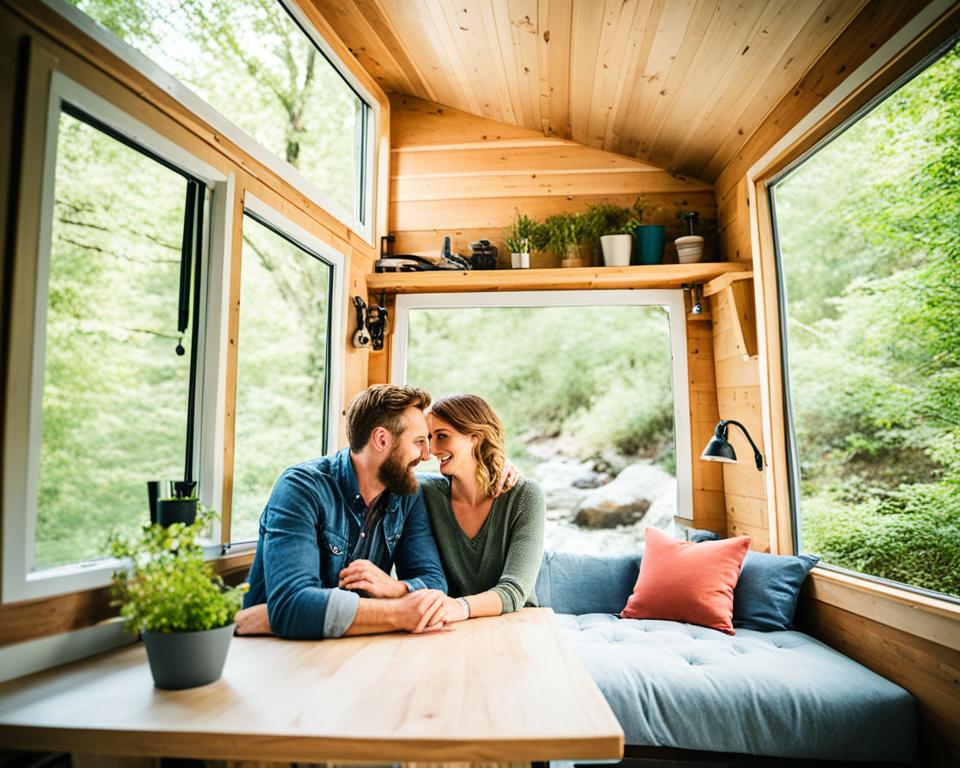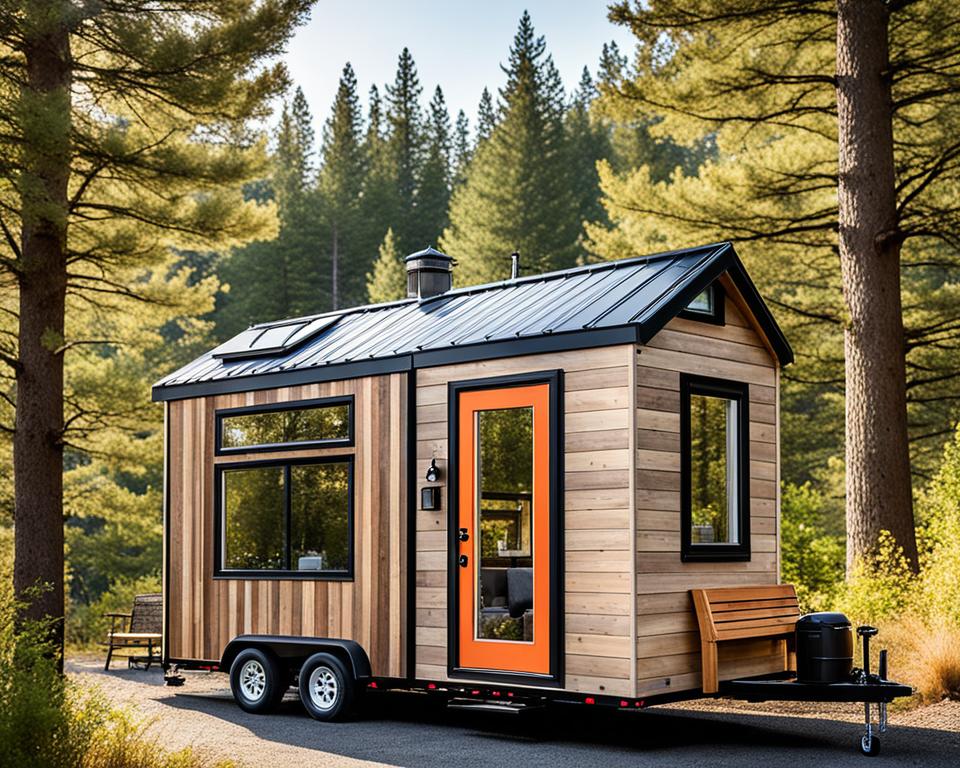Imagine moving from a traditional home to a dynamic, eco-friendly lifestyle. That’s what a tiny home on wheels offers. In a world with high housing costs, these portable tiny houses offer a way to own a home affordably and simply. They invite us to rethink what home means. In these mini mobile homes, every inch counts. But do these small mobile houses live up to their promise of freedom and savings? We’ll dive into compact mobile home living and see its big impact on our idea of home.
The charm of mobile tiny house living is hard to ignore. It challenges us to embrace minimalism as richness. Our hearts yearn to explore this exciting possibility. Where your home is not just a place, but an adventure. Join us in discovering how these tiny, mobile steps could change how we live and connect.
The Tiny House Movement: Embracing Simplicity and Sustainability
The tiny house movement is reshaping how we think about living spaces. It champions a life of less clutter, lower costs, and an eco-friendly approach to homes. People now choose tiny homes on wheels or small houses on the go. This choice reflects a commitment to saving the planet while finding deeper value in life.
The Philosophy Behind Downsizing to Tiny Homes
We downsize to find more freedom and joy in life. Having fewer things means we can enjoy life’s experiences more. Tiny homes teach us to live well in smaller areas. This isn’t just about making spaces work; it’s about living with values and leaving a lighter footprint on Earth.
Maximizing Space Efficiency: Storage and Multifunctional Furniture
We often dream of big homes with lots of room. But, mini mobile homes show us how to live well in tight spaces. They push us to be creative, using clever storage and furniture that has more than one use. Even with less room, these homes prove we don’t have to give up on comfort.
Financial and Environmental Benefits of Tiny House Mobile Homes
Choosing a compact living solution can save us money and help our planet. Mini mobile homes make owning a home more accessible for many. They need less energy, which lowers our carbon footprint. This way, we live more sustainably and responsibly.
Overcoming Zoning Challenges for Legal Tiny House Living
Legal issues can make it hard to live in a tiny house. We face many obstacles with zoning laws that don’t support our choice. Fighting these regulations is crucial for our homes to be recognized. We’re working to make a world where living in a tiny home on wheels is fully accepted.
Exploring Alternative Compact Living Solutions

The world of compact mobile home living is expanding. People want homes that are both affordable and eco-friendly. This has led to the rise of portable tiny houses. They are easy to move and cost less to live in. These homes are perfect for wanderers and those wanting to save money without giving up comfort.
Auxiliary dwelling units (ADUs) are also gaining popularity. They let homeowners use their property to the fullest. ADUs can be rented out or provide a private space for family. This use of land is smart and useful, especially in cities.
Park model RVs are another interesting option. They’re great for people who move around a lot or live seasonally in one place. These RVs are found in parks where there’s a sense of community. They also come with access to shared spaces and activities.
These compact living solutions each have their own special features. They offer different benefits for those looking for alternative housing options:
| Type | Key Features | Benefits | Best Suited For |
|---|---|---|---|
| Portable Tiny House | Portability, Customizable, Eco-friendly | Flexibility in location, Affordability, Lower carbon footprint | Nomads, Budget-conscious individuals |
| ADUs | Added property value, Versatility, Privacy | Income potential, Family convenience, Increase in usable living space | Homeowners with extra land, Families needing extra space for relatives |
| Park Model RVs | Community amenities, Seasonal living, Less maintenance | Social environment, Temporary lodging, Ease of relocation | Retirees, Vacationers |
The movement towards compact mobile home living is not just a fad. It’s an answer to the changing needs of our world. Not only does it offer a variety of living options, but it also supports a sustainable lifestyle. This push for smaller, unique homes is making a big impact. It is leading us to a future that focuses on being kind to the planet and offers options for all.
Tiny House Mobile Home: A Pathway to Affordable Homeownership
Compact living is capturing attention through the tiny house mobile home, a key to affordable living. These small homes offer a new view of owning a home that suits both budgets and eco-awareness. This approach presents an attractive alternative to the high costs of traditional houses.
Cost Comparison: Tiny Homes Vs. Traditional Housing
Tiny homes and traditional houses differ greatly in cost. A tiny home, with full functionality and design, can start at $60,000. This is way less than the cost of a bigger house. Such savings open doors to ownership for more people and frees up money for other things like investments or travel.
Finding Financial Flexibility with Tiny Homes on Wheels
Owning a tiny home on wheels brings a unique financial freedom. It lets owners move freely, driven by work opportunities or the desire for new experiences. This aspect is vital for those who seek flexibility and the blend of home with freedom to roam.
Investing in a Tiny Home: Financing and Insurance Considerations
Getting a tiny mobile house requires careful planning. Just like with traditional homes, you’ll need a down payment and to show you can pay. Thinking about insurance for your tiny home is wise to cover any damage or loss. Though upfront costs are real, the lower living costs from smaller utility and upkeep bills make for real savings, reinforcing the tiny house as a smart, cost-effective living choice.

